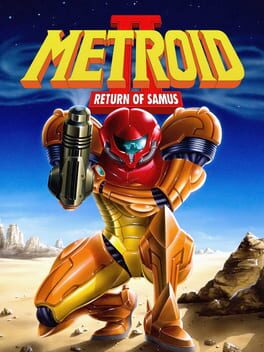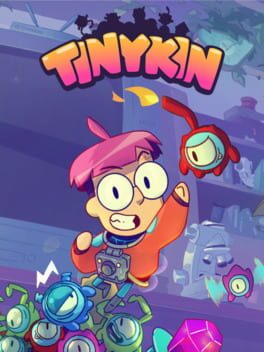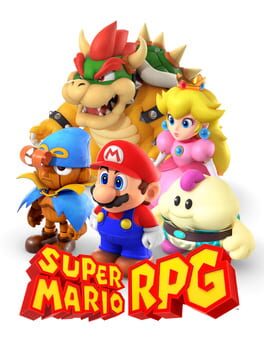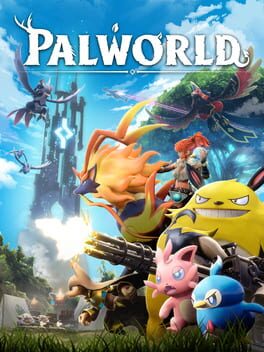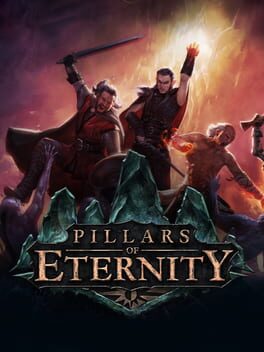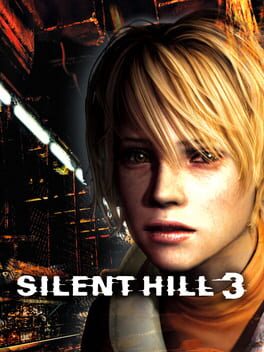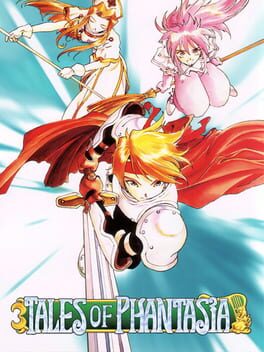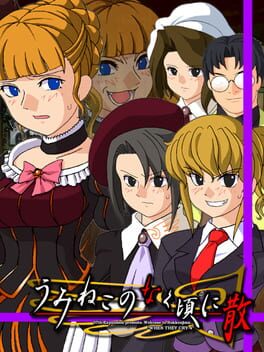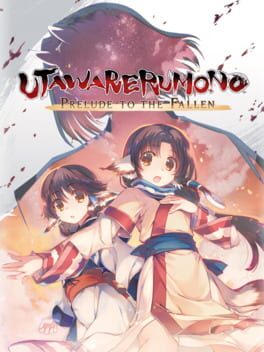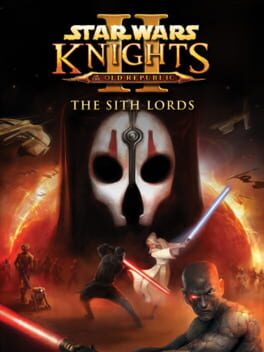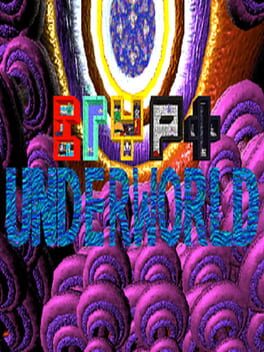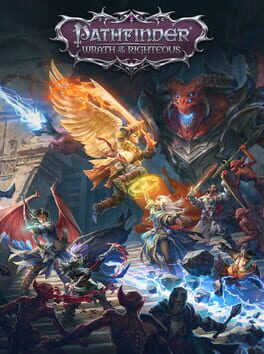crimson2877
266 Reviews liked by crimson2877
This game’s music and style is #awesome. I know it was supposed to be green but my emulator played it in black and white and the screen is super zoomed in, you can’t see 3 feet in front of you and the soundtrack is just these harsh noises and beeps and screeches, there’s rooms and dark hallways with no enemies and it gets more and more frequent the more you progress and the deeper into the planet you go. I feel so unwelcome, tense, out of my depth, and on edge. Super cool af.
I hear a lot about how metroid 1’s abrasive and alien design was lost in future games and while I do like the thought of duplicate rooms, death traps, and in general just map design that is meant to trip the player up and fuck with them, (See tricks and traps from doom 2; one of the greatest videogame levels of all time.) that wasn’t what stopped me from wanting to finish metroid 1. It was just unfun to control. Moving around sucked, shooting sucked, the health economy sucked unless you were willing to grind those bug ejecting tubes for like 10 minutes, and it was huge so if you got lost (no map) you were LOST for real. This game is genuinely fun to control, the movement as well as the combat is smooth and is up to modern standards. The game is much more linear so the lack of a map isn’t as big of a deal (though, not having any colour made it hard to mentally isolate where it was you needed to be. As well as remembering all these BS normal ass blocks that you can crawl thru.) ((double also, i’m probably a little advantaged on this front cause i played AM2R))
I do feel the metroid fights themselves got old really quick and despite the mutations my strategy of just tanking it all and spamming missiles never changed. It was like the same fight but reskinned and they gradually got more and more bullet spongey. And also there wasn’t enough health recharges in the later stages cause there were so little enemies to regain hp from. I had to backtrack just for hp. Later I looked it up (AFTER I FINISHED!!) and it turns out yea that was the closest one lol
I think this game is worth playing and I had fun. At least give this one a fair try.
I hear a lot about how metroid 1’s abrasive and alien design was lost in future games and while I do like the thought of duplicate rooms, death traps, and in general just map design that is meant to trip the player up and fuck with them, (See tricks and traps from doom 2; one of the greatest videogame levels of all time.) that wasn’t what stopped me from wanting to finish metroid 1. It was just unfun to control. Moving around sucked, shooting sucked, the health economy sucked unless you were willing to grind those bug ejecting tubes for like 10 minutes, and it was huge so if you got lost (no map) you were LOST for real. This game is genuinely fun to control, the movement as well as the combat is smooth and is up to modern standards. The game is much more linear so the lack of a map isn’t as big of a deal (though, not having any colour made it hard to mentally isolate where it was you needed to be. As well as remembering all these BS normal ass blocks that you can crawl thru.) ((double also, i’m probably a little advantaged on this front cause i played AM2R))
I do feel the metroid fights themselves got old really quick and despite the mutations my strategy of just tanking it all and spamming missiles never changed. It was like the same fight but reskinned and they gradually got more and more bullet spongey. And also there wasn’t enough health recharges in the later stages cause there were so little enemies to regain hp from. I had to backtrack just for hp. Later I looked it up (AFTER I FINISHED!!) and it turns out yea that was the closest one lol
I think this game is worth playing and I had fun. At least give this one a fair try.
Spec Ops: The Line
2012
This review contains spoilers
you know what? fuck it. spec ops: the line is worth five stars and then some. for a long time i sat on the fence about it, and had it collecting dust, uncommentated, at 4.5 stars - no more.
the fact this game was shuffled out-of-sight by 2k games, that an attempt is being made to erase its existence from the public under dubious pretenses at worst, or that it's been dropped in a double-whammy of corporate greed and convenient timing at best, shows us that this game is just as sorely needed now as it was 12 years ago.
many like to do a little joking about its "look what i made you do"-narrative, but those people are unaware that this precise portrayal of leadership at the hands of a vague authority is part of the point. this is taking down not merely the modern military shooter alone, but the entirety of the military industrial complex and its implications. the game design here is a direct analogue of the military chain of command, and the way it attempts to dissuade individuals and society as a whole from seeking blame in the hands of the actor.
on february 25th 2024, united states airforce member aaron bushnell self-immolated rather than continuing to maintain part in the u.s. military's support of yet another genocide - a genocide funded and fueled by this global force for despicable violence, a genocide committed, in part, with white phosphorous used against a civilian population.
the timing is just a bit TOO on-the-nose. we are supposed to forget that the same thing fuels this propaganda as fuels the systematic dehumanisation and killing of several peoples in asia and africa. spec ops, unlike every single other "modern military shooter", didnt flinch, and didnt lie. and for that, it had to disappear.
this is the only game that had the guts to give the player a gun, and let them shoot at a peaceful civilian population - then stand there with the implications of their actions. no fade-out. no game over. only you and the simulacrum of a dead body.
from the river to the sea, palestine will be free.
the fact this game was shuffled out-of-sight by 2k games, that an attempt is being made to erase its existence from the public under dubious pretenses at worst, or that it's been dropped in a double-whammy of corporate greed and convenient timing at best, shows us that this game is just as sorely needed now as it was 12 years ago.
many like to do a little joking about its "look what i made you do"-narrative, but those people are unaware that this precise portrayal of leadership at the hands of a vague authority is part of the point. this is taking down not merely the modern military shooter alone, but the entirety of the military industrial complex and its implications. the game design here is a direct analogue of the military chain of command, and the way it attempts to dissuade individuals and society as a whole from seeking blame in the hands of the actor.
on february 25th 2024, united states airforce member aaron bushnell self-immolated rather than continuing to maintain part in the u.s. military's support of yet another genocide - a genocide funded and fueled by this global force for despicable violence, a genocide committed, in part, with white phosphorous used against a civilian population.
the timing is just a bit TOO on-the-nose. we are supposed to forget that the same thing fuels this propaganda as fuels the systematic dehumanisation and killing of several peoples in asia and africa. spec ops, unlike every single other "modern military shooter", didnt flinch, and didnt lie. and for that, it had to disappear.
this is the only game that had the guts to give the player a gun, and let them shoot at a peaceful civilian population - then stand there with the implications of their actions. no fade-out. no game over. only you and the simulacrum of a dead body.
from the river to the sea, palestine will be free.
Tinykin
2022
Red Pikmin: Cool with fire, can be squished, will kill in your name, make me sad when they die
Red Tinykin: YES LIGHT ME BLOW ME UP SET ME ABLAZE KILL ME BANG BANG BANG I AM NOT A SOLDIER I AM THE AMMUNITION I WANT NOTHING MORE THAN A SUDDEN EXPLOSIVE DEATH JUST TO LIGHT A TORCH OR CLEAR A ROADBLOCK OR WHATEVER HAHAHA WHEEEEEEEEEEE
Red Tinykin: YES LIGHT ME BLOW ME UP SET ME ABLAZE KILL ME BANG BANG BANG I AM NOT A SOLDIER I AM THE AMMUNITION I WANT NOTHING MORE THAN A SUDDEN EXPLOSIVE DEATH JUST TO LIGHT A TORCH OR CLEAR A ROADBLOCK OR WHATEVER HAHAHA WHEEEEEEEEEEE
Super Mario RPG
2023
Having not played the original when I was a kid, I did everything possible to get as close to the child-like experience:
Step 1 - Remove all four of your wisdom teeth
Step 2 - Take painkillers before reverting to baby-state and sleep for 24 hours
Step 3 - After baby-state hibernation is complete, awaken as a young disgruntled adolescent who lays on the couch for days on end while playing Mario RPG and eating copious amounts of jello and pudding
Step 4 - Add in watching some Sopranos and some more painkillers and realize the connections between the New Jersey mob and the Super Mario RPG gang - Mario is obviously Tony leading the gang but still has some issues, Mallow is Christopher who comes along early and immediately you're like ah this fucking guy c'mon bro but then he comes in clutch a few times, Geno is Silvio the right hand man, Bowser is the combo of Paulie and Big Pussy with the fat guy enforcer aesthetic, and Peach is the smokin' hot therapist as evidenced by her first special move being called 'Therapy.' The Smithy gang are a combo of Tony's own family and his fears of losing his kingdom - put a pair of glasses on Exor's sword or Smithy and tell me that's not Uncle Junior in the flesh.
Step 5 - Write this dumbass review and boot up Paper Mario
Step 1 - Remove all four of your wisdom teeth
Step 2 - Take painkillers before reverting to baby-state and sleep for 24 hours
Step 3 - After baby-state hibernation is complete, awaken as a young disgruntled adolescent who lays on the couch for days on end while playing Mario RPG and eating copious amounts of jello and pudding
Step 4 - Add in watching some Sopranos and some more painkillers and realize the connections between the New Jersey mob and the Super Mario RPG gang - Mario is obviously Tony leading the gang but still has some issues, Mallow is Christopher who comes along early and immediately you're like ah this fucking guy c'mon bro but then he comes in clutch a few times, Geno is Silvio the right hand man, Bowser is the combo of Paulie and Big Pussy with the fat guy enforcer aesthetic, and Peach is the smokin' hot therapist as evidenced by her first special move being called 'Therapy.' The Smithy gang are a combo of Tony's own family and his fears of losing his kingdom - put a pair of glasses on Exor's sword or Smithy and tell me that's not Uncle Junior in the flesh.
Step 5 - Write this dumbass review and boot up Paper Mario
Palworld
2024
Pillars of Eternity
2015
What a fucking game, my dudes and duderinas. I played Pillars of Eternity when it came out way back in 2015 and while I loved it then, I think I still didn't quite get it. The game throws a ton of lore and setting exposition right at the very beginning and it never lets up, which made it difficult, for me anyway, to connect with the setting. However, deeper into the game things do start to fall in place, and as a setting, Eora is incredibly rich not only in history, cultural diversity, and storytelling, but in its ideas and prose as well. Every character the player will meet in Pillars of Eternity comes with his or her own set of flaws, ambitions, and perspective of the world around them that are grounded in the same storytelling and universe that the player experiences, and while they do have realism woven into their personalities, the character writing is more literary mythic than anything else. Eora and its denizens are heavily steeped in historical context within the game-world as well as within the philosophical context of their real world inspirations. Memory, history, and reconciliation of past and present are ever-present throughout the game's narrative and companions.
While the dense writing and lore may cause a barrier to entry on the writing side, Pillars of Eternity's combat and RPG systems are wonderfully CRPG beginner friendly. Every attribute is meaningful and can contribute to any build which makes it difficult to brick a character, allowing for roleplay to take precedence across builds. Obviously, as with any CRPG, min-maxing optimization can occur if a player desires to powergame, but the system does not punish more casual players, resulting in a positive experience for both ends of the spectrum. I played a rogue who wore heavy plate armor and used a gun, but the standard light-armored sneaky rogue would work just as well, for example.
However, the real highlights of Pillars of Eternity happen when the game turns all of this worldbuilding on its head and finally considers the implications of the ideas it sets forth. Themes of post-colonialism, ontology, historical relevance, nihilism, and imperial exceptionalism all are not only represented within the game, but are confronted directly by the player. It's not enough just to represent these ideas within the game world - the player is specifically tasked to think about philosophical questions in order to progress through conversations and form plans on how to move forward.
Few games seem to do this as openly and bluntly as Pillars of Eternity does, and while the game may have originally existed as a kickstarter project meant to placate fans, like myself, of Baldur's Gate, narratively Pillars of Eternity is much more in line with something like Planescape: Torment or Bethesda's post-modernist take on fantasy lore via Morrowind. Like all celebrated and dissected mythologies, Eora isn't afraid to get both historical and weird in order to confront our idea of humanity and the world we live in.
While the dense writing and lore may cause a barrier to entry on the writing side, Pillars of Eternity's combat and RPG systems are wonderfully CRPG beginner friendly. Every attribute is meaningful and can contribute to any build which makes it difficult to brick a character, allowing for roleplay to take precedence across builds. Obviously, as with any CRPG, min-maxing optimization can occur if a player desires to powergame, but the system does not punish more casual players, resulting in a positive experience for both ends of the spectrum. I played a rogue who wore heavy plate armor and used a gun, but the standard light-armored sneaky rogue would work just as well, for example.
However, the real highlights of Pillars of Eternity happen when the game turns all of this worldbuilding on its head and finally considers the implications of the ideas it sets forth. Themes of post-colonialism, ontology, historical relevance, nihilism, and imperial exceptionalism all are not only represented within the game, but are confronted directly by the player. It's not enough just to represent these ideas within the game world - the player is specifically tasked to think about philosophical questions in order to progress through conversations and form plans on how to move forward.
Few games seem to do this as openly and bluntly as Pillars of Eternity does, and while the game may have originally existed as a kickstarter project meant to placate fans, like myself, of Baldur's Gate, narratively Pillars of Eternity is much more in line with something like Planescape: Torment or Bethesda's post-modernist take on fantasy lore via Morrowind. Like all celebrated and dissected mythologies, Eora isn't afraid to get both historical and weird in order to confront our idea of humanity and the world we live in.
Silent Hill 3
2003
This day has finally come.
That's right -- the day when you and I will meet.
I was always thinking of you,
here with this DS4 controller in my hand.
I never even knew your name
or face until today.
But now I know.
Oh how I love you, Heather.
It's okay that you run funny
with your feet out to the side.
Or that you got killed by a mirror.
Hey, it happens.
You are still a great protagonist.
Your skill rivaling Sekiro,
with a blade as sharp as your snark.
I guess a hair dryer works too, in a pinch.
I knew you'd defeat your competition.
She doesn't even have eyebrows.
Wait, did she really just eat that???
Either way, great job at being cool.
Thanks for letting me play your game.
After all, you and I exist as one.
What I give to you is the same as
what I give to me.
- Stanley Coleman
That's right -- the day when you and I will meet.
I was always thinking of you,
here with this DS4 controller in my hand.
I never even knew your name
or face until today.
But now I know.
Oh how I love you, Heather.
It's okay that you run funny
with your feet out to the side.
Or that you got killed by a mirror.
Hey, it happens.
You are still a great protagonist.
Your skill rivaling Sekiro,
with a blade as sharp as your snark.
I guess a hair dryer works too, in a pinch.
I knew you'd defeat your competition.
She doesn't even have eyebrows.
Wait, did she really just eat that???
Either way, great job at being cool.
Thanks for letting me play your game.
After all, you and I exist as one.
What I give to you is the same as
what I give to me.
- Stanley Coleman
Tales of Phantasia
1998
Loved this to bits -- it's solid and excellent, in a subtle way. A few notes:
- This isn't Final Fantasy VII -- dungeons are numerous, mazey, long, and chock-full of random encounters. Multiple times the main story pauses until you go to two or three dungeons (in any order) to get the required plot tokens. This is bad if you see rpg dungeons as an unpleasant obstacle in the way of progressing the rpg story. But I loved the combat system, and I was in the mood for a classic, dungeon-y, meat-and-potatoes jrpg, so I had a really fun time.
- Small cast sizes are good! There are only six playable characters, and they all get plenty of time to shine throughout the story. I semi-recently played FF9 and Xenogears for the first time; both those games have much bigger casts, and both drop the ball with many of their characters. There are no Ricos or Freyas here, characters with a couple good scenes early on that have nothing to do otherwise. The skits, added in the PSX remake, obviously go a long way in helping me further connect with the characters. Their ending resolutions, and the extended pre-final dungeon scene in Early, cemented them in my heart as an all-time favorite rpg cast. (The excellent, playful writing in the Phantasian Productions patch also definitely helped.)
- The main villain is introduced in the first seconds of the game, and he stays the main villain for the entire story. There's no bait-and-switch, no big twist. There are two main act break setpieces, one about three hours in and one about twenty hours in, that each further establish the villain and develop your relationship with him. When I got to the finale and the full arc of his story was revealed to me, I was really moved. A big part of that is that they didn't pull a new villain out of their ass for the final boss -- this is Dhaos's story from start to finish as much as it is Cress and co.'s, and that's a rare feat for an RPG story.
The only other Tales game I've played is Vesperia, and it frustrated me because of its extremely long, sloppy story full of dropped threads and its very easy fighting. Phantasia was the perfect antidote -- it's more tightly focused, and the dramatic fights kicked my ass. I have a lot of friends that adore Tales; I'm really happy I found the right game to invite me into the series.
- This isn't Final Fantasy VII -- dungeons are numerous, mazey, long, and chock-full of random encounters. Multiple times the main story pauses until you go to two or three dungeons (in any order) to get the required plot tokens. This is bad if you see rpg dungeons as an unpleasant obstacle in the way of progressing the rpg story. But I loved the combat system, and I was in the mood for a classic, dungeon-y, meat-and-potatoes jrpg, so I had a really fun time.
- Small cast sizes are good! There are only six playable characters, and they all get plenty of time to shine throughout the story. I semi-recently played FF9 and Xenogears for the first time; both those games have much bigger casts, and both drop the ball with many of their characters. There are no Ricos or Freyas here, characters with a couple good scenes early on that have nothing to do otherwise. The skits, added in the PSX remake, obviously go a long way in helping me further connect with the characters. Their ending resolutions, and the extended pre-final dungeon scene in Early, cemented them in my heart as an all-time favorite rpg cast. (The excellent, playful writing in the Phantasian Productions patch also definitely helped.)
- The main villain is introduced in the first seconds of the game, and he stays the main villain for the entire story. There's no bait-and-switch, no big twist. There are two main act break setpieces, one about three hours in and one about twenty hours in, that each further establish the villain and develop your relationship with him. When I got to the finale and the full arc of his story was revealed to me, I was really moved. A big part of that is that they didn't pull a new villain out of their ass for the final boss -- this is Dhaos's story from start to finish as much as it is Cress and co.'s, and that's a rare feat for an RPG story.
The only other Tales game I've played is Vesperia, and it frustrated me because of its extremely long, sloppy story full of dropped threads and its very easy fighting. Phantasia was the perfect antidote -- it's more tightly focused, and the dramatic fights kicked my ass. I have a lot of friends that adore Tales; I'm really happy I found the right game to invite me into the series.
Review
I gave it a real shot, for 8 hours!
You can read my notes and thoughts here : https://twitter.com/han_tani2/status/1735187901296836666
Or read an essay in which I discuss TotK https://melodicambient.substack.com/p/why-ocarina-of-time-cant-be-recreated
The short version is: the game has its nice charming moments, I actually like the idea of janky physics dungeons and riding around on stuff. NPC designs are nice and some of the side quests looked interesting. But I hattteee the crafting stuff, it kind of ends up padding almost everything in the game out. There's also so much distraction, it feels like YouTube recommendations or TikTok...
Shitpost review
Zelda but if Miyamoto wasn't inspired by wandering the countryside as a kid but opening up Genshin enough times to get the 30 day login bonus
I gave it a real shot, for 8 hours!
You can read my notes and thoughts here : https://twitter.com/han_tani2/status/1735187901296836666
Or read an essay in which I discuss TotK https://melodicambient.substack.com/p/why-ocarina-of-time-cant-be-recreated
The short version is: the game has its nice charming moments, I actually like the idea of janky physics dungeons and riding around on stuff. NPC designs are nice and some of the side quests looked interesting. But I hattteee the crafting stuff, it kind of ends up padding almost everything in the game out. There's also so much distraction, it feels like YouTube recommendations or TikTok...
Shitpost review
Zelda but if Miyamoto wasn't inspired by wandering the countryside as a kid but opening up Genshin enough times to get the 30 day login bonus
Wound up loving this one. The beginning's very strong, the cast is wonderful, and the episodic stories throughout the middle are lovely (excepting the one with the inn owner/princess, it was apparently added to the console ports and you can feel it). But it's the climax/ending that really brought this one home for me. The lore bombs are honestly pretty ridiculous, but they still worked for me because they're grounded in Hakuowlo's journey, in the journies of the cast. Cried a whole lot multiple times through the concluding episodes.
I think where most folks will struggle is that there's very little urgency to most of the story; you really have to trust that it's taking you somewhere. It's a lot like Trails in that sense. But if you can give it that trust, if you're willing to luxuriate in the cast and world without real plot progression for long stretches, I think the game ultimately rewards you for your investment.
I think where most folks will struggle is that there's very little urgency to most of the story; you really have to trust that it's taking you somewhere. It's a lot like Trails in that sense. But if you can give it that trust, if you're willing to luxuriate in the cast and world without real plot progression for long stretches, I think the game ultimately rewards you for your investment.
Kinda heartbreaking because I think the story here was like two more draft cycles away from being an all-time great. The more complex theming here is obviously very welcome; I loved playing the first game but thought the story was pretty slight. As is though II's just not incisive enough for me, it feels too adrift in its abstract Star Wars-isms. I get what the theming is going for, but you can't just have good ideas. You have to dramatize them, make me feel them in the pit of my gut. You know, like Planescape: Torment (by the same writer) was extremely good at doing.
It doesn't help that it's such a fuckin' bummer. I love tons of games that end on sad notes, but I dunno y'all, I finished it on my birthday and I was just like "cool, great, why did I put forty hours into this." Again, it could've been chef's kiss perfect if it had really come together for me, but even with the patch I just don't think the story's all the way there.
It doesn't help that it's such a fuckin' bummer. I love tons of games that end on sad notes, but I dunno y'all, I finished it on my birthday and I was just like "cool, great, why did I put forty hours into this." Again, it could've been chef's kiss perfect if it had really come together for me, but even with the patch I just don't think the story's all the way there.
Crypt Underworld
2023
Such a great first-person 3D exploration game. The simple immersive sim mechanics give just enough depth to make it easy to set your own goals and decisions as to what you'll navigate throughout the game's world. The art decisions and layout have this great sense of imagination to them. You can find furniture and a bunch of funny / interesting little moments. "Perfect Animal Crossing..."
I'm putting this on Shelved and not Abandoned out of sheer cope.
Damn, I'm fairly torn on this. On one side of the scale, it has a very deep implementation of Pathfinder that warms my heart. I got all the nostalgia fuzzies seeing everything - I spent a huge amount of time playing Pathfinder and it's what I learned to DM on, so I really loved that. Golarion is a fantastic setting as well, and it's really cool to see storytelling take place here with everything I'd only read in handbooks brought to life. I loved that so much.
Unfortunately, while in theory I should be gushing about this game, there's something about it that just does not hook me. The writing is solid, but the characters still somehow feel stale in execution, even when the ideas of the characters are solid. The gameplay system is a treat as well - as I said, I really enjoy this implementation of the ruleset's intricacies, but I can't help but feel that somehow the encounter design is a bit hollow. I can't quite put my finger on it, but it just does not click.
Still, I was enjoying myself and found myself sinking deeper and deeper in the game during Act 1, and by the time that finished was ready for the game to dive in and go for it. Then...I was hit with the Crusade system instead, which put a little bit of weight on the opposite end of the scale. I tolerated it in Act 2, but in Act 3 it gets even more robust and combined with everything else outlined above, this bit of friction firmly tipped the negative side of the scale downward, killing most of my interest in coming back. It feels like Owlcat made two separate games and then mashed them together, and it just does not work. I realize there is a mod that pretty much removes the Crusade component, but I think I'm done for now. I'll use that mod as my cope for labeling this as shelved and not abandoned. Maybe someday.
Damn, I'm fairly torn on this. On one side of the scale, it has a very deep implementation of Pathfinder that warms my heart. I got all the nostalgia fuzzies seeing everything - I spent a huge amount of time playing Pathfinder and it's what I learned to DM on, so I really loved that. Golarion is a fantastic setting as well, and it's really cool to see storytelling take place here with everything I'd only read in handbooks brought to life. I loved that so much.
Unfortunately, while in theory I should be gushing about this game, there's something about it that just does not hook me. The writing is solid, but the characters still somehow feel stale in execution, even when the ideas of the characters are solid. The gameplay system is a treat as well - as I said, I really enjoy this implementation of the ruleset's intricacies, but I can't help but feel that somehow the encounter design is a bit hollow. I can't quite put my finger on it, but it just does not click.
Still, I was enjoying myself and found myself sinking deeper and deeper in the game during Act 1, and by the time that finished was ready for the game to dive in and go for it. Then...I was hit with the Crusade system instead, which put a little bit of weight on the opposite end of the scale. I tolerated it in Act 2, but in Act 3 it gets even more robust and combined with everything else outlined above, this bit of friction firmly tipped the negative side of the scale downward, killing most of my interest in coming back. It feels like Owlcat made two separate games and then mashed them together, and it just does not work. I realize there is a mod that pretty much removes the Crusade component, but I think I'm done for now. I'll use that mod as my cope for labeling this as shelved and not abandoned. Maybe someday.
Baldur's Gate 3
2020
Baldur’s Gate 1 and 2 are my favorite games of all time, so when I saw the first trailer for Baldur’s Gate 3, I was beyond excited. I knew it was going to be a little different, as the story in the original games is pretty well wrapped up with nowhere to go narratively, but Black Isle had plans for a third entry (The Black Hound), so I figured things would be able to be worked out. I was also completely geeking out because I absolutely love Mind Flayers. They were terrifying in Baldur’s Gate 2, and there was a whole cut/unfinished subplot with a Mind Flayer colony in Athkatla that just brimmed with potential on how they could connect the dots here. One of my DND group’s favorite dungeons we ever ran was a giant library in the astral plane that had been taken over by a singular Mind Flayer that I tortured them with through manipulation, stealth, cunning, and pitting them against each other over 12 hours. By the end of it, they were deathly afraid of him and hated his guts. It was fantastic. I was really ready to love this game…and I tried so hard, but I just don’t.
Turns out, it was a bad idea to make the new 5th Edition game Baldur’s Gate 3. There is a fantastic skeleton here with interesting characters and fun locations, but as a huge fan of the early games, I can’t help but feel like it’s significantly held back by what Wizards of the Coast did to the Baldur’s Gate canon. BG3 isn’t a sequel to Baldur’s Gate 1 and 2 - it’s a sequel to the WotC canon of Baldur’s Gate, and it’s done very poorly. Some of the characters that appear are completely divorced from their characters in the originals, as if the person writing them had no idea of their motivations or any understanding of who these people are. I don’t know whether to blame that on Wizards for the terrible choices regarding canon, or to blame Larian for the awful characterization, but it drove me insane. I realize I might sound like a whiny old-head, but it is just such a strange choice to make a sequel based on a game when you can’t actually adhere to the plot of that game.
The legacy characters aren’t the only strange moments of Baldur’s Gate 3’s writing unfortunately, as it struggles to maintain a foundation between being grounded in the Forgotten Realms setting while wanting to tell a grandiose story. At the beginning of the game, I recruited three companions - one that was incredibly fearsome fighting Demons in the Blood War, another was such a powerful mage that he actually had an intimate relationship with the Goddess of Magic herself, and the last one was sent on a mission to retrieve an incredibly powerful and rare artifact from a race of other dimensional beings. They’re also level 1 and we’re fighting goblins. This type of narrative/world disconnect continues on throughout the rest of the game and I constantly felt out of place and just at odds with the game’s representation of the Forgotten Realms.
For a game that is effusively praised for player freedom - don’t get me wrong there is a ton of it - it does itself no favors with regards to pacing. In particular, Act 2 is paced in such a way that players easily can find themselves locked out of almost all the Act’s content if they simply explore the area, which is the exact opposite of how Act 1 encouraged gameplay. When Act 3 rolls around, BG3 again flips things around and gives a giant sandbox city to run around it, all the while dumping quests on you that beg to be solved with urgency. There isn’t inherently anything wrong in this approach, but because the pacing isn’t consistent across the game, it can be very overwhelming and disorienting.
This disorienting feeling carries over to companion quests and the rest system as well, as the game seems to discourage you from long resting too often, but in order to continue companion quests, long rests at camp are necessary. I actually missed an entire companion questline because I did not rest enough in Act 2, and it wasn’t until late game that I realized the game does actually have a cue to tell you to rest. Every time a party member complains about being tired, a new conversation or cutscene is available at camp. Otherwise, the resting mechanic makes a nice balance between the original games’ dungeon rest-a-thons, and the fear of running out of resources in combat.
Encounters and combat were something I personally was worried about, as I’m much more a fan of the Real Time with Pause system, but I actually think Larian did a great job implementing 5e into crpg format. Most of the time, combat feels engaging and quick due to the encounter and level design, and the environment takes a much bigger stage than it ever did in the older games. Later on, the encounters do seem to fall off regarding intentionality and then it can be frustrating when there are just too many enemies and allies for things to go quickly. In the later stages of the game, Larian also becomes obsessed with placing trap after trap, which just makes things tedious in this engine. Traps are a classic part of DND dungeon design, but throwing 6 of the same DC trap in a room does not make a good dungeon. Honestly, this is true for the game at large. Act 1 in all of its Early Access polished glory is wonderful in pacing, encounter design, world detail, and narrative beats, however the whole thing starts to fall apart as the game goes on and then all of the little, minor things that were overlooked as nitpicks start to become giant thorns.
While the combat system mostly does a good job, it does lack polish with basic functionality. There were so many times that I clicked to attack an enemy, was told “too far, can’t reach,” and then I moved my character manually in range and was able to attack. There were entire battles where certain enemies just stood still for their turn, wasting 10-20 seconds without doing anything. There were times in which I got stuck with one character fighting six by himself because the pathing for the other character broke while jumping, and they couldn’t join combat until forced because they were stuck in a different spot. There were many times where I was told I could not see the enemy, only to swivel the camera around to find that character has a perfect line of sight on the enemy, but just can’t attack because the game says no. After 50-plus hours, all of that began to wear me down, and the experience just felt clunky. Apart from those minor things, I also started to hit real bugs like companions talking to me about events that haven’t happened yet, doors not loading, people popping into cutscenes, among others.
It is highly ironic that Baldur’s Gate 3 has gotten so much praise from people pitting it against other AAA releases that were deemed broken, as if the game does not have its share of cracks and broken bits as well. Ultimately, there is a good game here that I’m sure will grow and be ironed out as a “Definitive Edition” arrives, but for me the entire experience was disappointing and lacking. Baldur’s Gate 3 nails the upfront presentation with cinematic style, but what lies beneath is mediocrity.
Turns out, it was a bad idea to make the new 5th Edition game Baldur’s Gate 3. There is a fantastic skeleton here with interesting characters and fun locations, but as a huge fan of the early games, I can’t help but feel like it’s significantly held back by what Wizards of the Coast did to the Baldur’s Gate canon. BG3 isn’t a sequel to Baldur’s Gate 1 and 2 - it’s a sequel to the WotC canon of Baldur’s Gate, and it’s done very poorly. Some of the characters that appear are completely divorced from their characters in the originals, as if the person writing them had no idea of their motivations or any understanding of who these people are. I don’t know whether to blame that on Wizards for the terrible choices regarding canon, or to blame Larian for the awful characterization, but it drove me insane. I realize I might sound like a whiny old-head, but it is just such a strange choice to make a sequel based on a game when you can’t actually adhere to the plot of that game.
The legacy characters aren’t the only strange moments of Baldur’s Gate 3’s writing unfortunately, as it struggles to maintain a foundation between being grounded in the Forgotten Realms setting while wanting to tell a grandiose story. At the beginning of the game, I recruited three companions - one that was incredibly fearsome fighting Demons in the Blood War, another was such a powerful mage that he actually had an intimate relationship with the Goddess of Magic herself, and the last one was sent on a mission to retrieve an incredibly powerful and rare artifact from a race of other dimensional beings. They’re also level 1 and we’re fighting goblins. This type of narrative/world disconnect continues on throughout the rest of the game and I constantly felt out of place and just at odds with the game’s representation of the Forgotten Realms.
For a game that is effusively praised for player freedom - don’t get me wrong there is a ton of it - it does itself no favors with regards to pacing. In particular, Act 2 is paced in such a way that players easily can find themselves locked out of almost all the Act’s content if they simply explore the area, which is the exact opposite of how Act 1 encouraged gameplay. When Act 3 rolls around, BG3 again flips things around and gives a giant sandbox city to run around it, all the while dumping quests on you that beg to be solved with urgency. There isn’t inherently anything wrong in this approach, but because the pacing isn’t consistent across the game, it can be very overwhelming and disorienting.
This disorienting feeling carries over to companion quests and the rest system as well, as the game seems to discourage you from long resting too often, but in order to continue companion quests, long rests at camp are necessary. I actually missed an entire companion questline because I did not rest enough in Act 2, and it wasn’t until late game that I realized the game does actually have a cue to tell you to rest. Every time a party member complains about being tired, a new conversation or cutscene is available at camp. Otherwise, the resting mechanic makes a nice balance between the original games’ dungeon rest-a-thons, and the fear of running out of resources in combat.
Encounters and combat were something I personally was worried about, as I’m much more a fan of the Real Time with Pause system, but I actually think Larian did a great job implementing 5e into crpg format. Most of the time, combat feels engaging and quick due to the encounter and level design, and the environment takes a much bigger stage than it ever did in the older games. Later on, the encounters do seem to fall off regarding intentionality and then it can be frustrating when there are just too many enemies and allies for things to go quickly. In the later stages of the game, Larian also becomes obsessed with placing trap after trap, which just makes things tedious in this engine. Traps are a classic part of DND dungeon design, but throwing 6 of the same DC trap in a room does not make a good dungeon. Honestly, this is true for the game at large. Act 1 in all of its Early Access polished glory is wonderful in pacing, encounter design, world detail, and narrative beats, however the whole thing starts to fall apart as the game goes on and then all of the little, minor things that were overlooked as nitpicks start to become giant thorns.
While the combat system mostly does a good job, it does lack polish with basic functionality. There were so many times that I clicked to attack an enemy, was told “too far, can’t reach,” and then I moved my character manually in range and was able to attack. There were entire battles where certain enemies just stood still for their turn, wasting 10-20 seconds without doing anything. There were times in which I got stuck with one character fighting six by himself because the pathing for the other character broke while jumping, and they couldn’t join combat until forced because they were stuck in a different spot. There were many times where I was told I could not see the enemy, only to swivel the camera around to find that character has a perfect line of sight on the enemy, but just can’t attack because the game says no. After 50-plus hours, all of that began to wear me down, and the experience just felt clunky. Apart from those minor things, I also started to hit real bugs like companions talking to me about events that haven’t happened yet, doors not loading, people popping into cutscenes, among others.
It is highly ironic that Baldur’s Gate 3 has gotten so much praise from people pitting it against other AAA releases that were deemed broken, as if the game does not have its share of cracks and broken bits as well. Ultimately, there is a good game here that I’m sure will grow and be ironed out as a “Definitive Edition” arrives, but for me the entire experience was disappointing and lacking. Baldur’s Gate 3 nails the upfront presentation with cinematic style, but what lies beneath is mediocrity.
